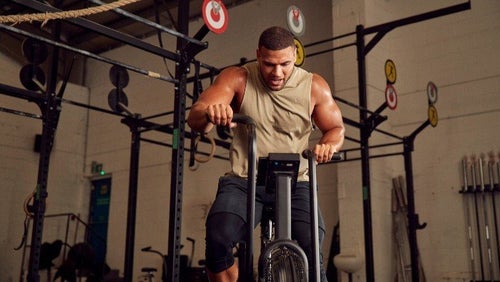Here’s What Happens When You Take A Break From Your Fitness Routine

First off, if you’re worried about missing a day’s workout, then stop reading after the next sentence. It’s totally okay to miss a day and this will have absolutely no impact on your fitness levels or body composition — in fact, it might actually do you some good to rest up.
If it’s been a week or two, or even a couple of months, then you can expect a few changes in strength, endurance, body fat, and metabolism to name a few. Here’s what to expect week by week…

Week 1
Taking a week of from training probably won’t do you much harm at all. In fact, a week of relaxing, longer sleeps, and a bit of stretching may do wonders for your recovery, injury prevention, and energy levels, leaving you ready to hit your routine head on the week after.
If you have to take more than a week off, then look at fitting in a reduced workout schedule as this will slow down the effects of a sedentary lifestyle — remember, anything is better than nothing.
Week 2
According to research, this is the week that you’ll start to see a reduction in your aerobic capacity. Feel like your lungs might explode after taking the stairs? That’ll be why…
One study found that VO2 max decreased by 50% in rats after 2 weeks of no exercise — that’s the optimum rate at which your lungs, muscles, and heart can use oxygen during exercise. Another study of elite football players found that their high intensity sprint performance was negatively affected after 2 weeks off. You perhaps don’t need to worry quite so much about body composition though, as this study found no significant difference in body composition after this period.
1 month
Even if you’re an elite athlete, after a month or more off from regular exercise, you’re going to notice a few changes. One study looking at competitive swimmers found that body fat mass increased by around 12% and there was also a decrease in VO2 max after 4-5 weeks. This study was only on 8 swimmers, but other studies have shown similar results too.
Another study on elite athletes found that endurance decreased by 21% after 4 weeks of detraining. It’s not all bad news though, if you’ve skipped training for a month, then your strength can be more or less maintained after a month off, however, if this strength is recently gained then you may feel a greater loss than someone who’s been training for a while, according to another study.
2+ months
Put it this way, don’t expect to be able to lift your previous PB on your first day back. After this much time away from exercise, you’re probably going to be feeling pretty unfit. Whether it’s from injury, or another reason entirely, don’t let starting from square one put you off.
In fact, some research makes us think it’s easier to get back to where you were the second time than it was the first. Some studies claim that “muscle memory” means that some special cells in your muscles remember how to do certain movements, making it easier to progress than the first time (still takes a ton of hard work though).
Take home message
Remember, however long it’s been, it’s never too late to start up again. If your fitness routine is being put on the back burner for a while, then keep in mind that anything is better than nothing when it comes to exercise — squeezing in ten minutes here and there, or working around an injury can make all the difference to your health, overall fitness, and body composition.
READ THIS NEXT:

14 Chest Exercises For Your Home Workout
If you thought you needed the gym to pump up your pecs, think again.

5 Things You Can Do In The Training Range Collection
Find out how you can test the limits of the Raw Collection.

1. Kemi, O. J., Haram, P. M., Wisløff, U., & Ellingsen, Ø. (2004). Aerobic fitness is associated with cardiomyocyte contractile capacity and endothelial function in exercise training and detraining. Circulation, 109(23), 2897-2904.
2. Joo, C. H. (2018). The effects of short term detraining and retraining on physical fitness in elite soccer players. PloS one, 13(5).
3. Ormsbee, M. J., & Arciero, P. J. (2012). Detraining increases body fat and weight and decreases V [combining dot above] O2peak and metabolic rate. The Journal of Strength & Conditioning Research, 26(8), 2087-2095.
4. Madsen, K., Pedersen, P. K., Djurhuus, M. S., & Klitgaard, N. A. (1993). Effects of detraining on endurance capacity and metabolic changes during prolonged exhaustive exercise. Journal of Applied Physiology, 75(4), 1444-1451.
5. MUJIKA, I., & Padilla, S. (2001). Muscular characteristics of detraining in humans. Medicine & Science in Sports & Exercise, 33(8), 1297-1303.
6. Staron, R. S., Leonardi, M. J., Karapondo, D. L., Malicky, E. S., Falkel, J. E., Hagerman, F. C., & Hikida, R. S. (1991). Strength and skeletal muscle adaptations in heavy-resistance-trained women after detraining and retraining. Journal of Applied Physiology, 70(2), 631-640.









